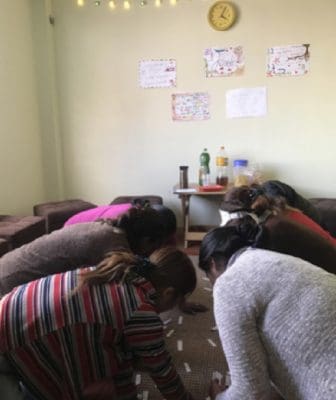Knowing Each Other by Our Real Names
“No one has ever believed me before.” There is trust in intimacy.
“I can’t believe I finally said that out loud…that feels so good!” There is freedom in intimacy.
“There are still so many things that are scary and worrying, but I know I can accept God’s peace and love within me.” There is transformation in intimacy.
In the social work world, we talk a lot about how people change, heal, and grow. There are textbooks full of different theories and approaches, suggestions for different populations and different diagnoses, best practices for varying needs and preferences. While I hope to grow in wisdom and expertise in a professional sense, my own experiences as well as investigative studies increasingly reveal that one of the primary indicators for a person to be able to overcome challenges and to resist the detrimental impacts of trauma in the first place, is relationship. But relationship doesn’t simply mean being able to name a few people in your social circles; it’s the real and raw, “I’m not okay and I have no idea what to do, but I know that you’re here.” And it goes both ways — it’s the other person saying, verbally or otherwise, “I don’t know what to say, but I’m sorry this is so hard and I’m not going anywhere.” Relationship reaches its full potential when it is built upon trust, mutuality, grace, and the courage to challenge for good. That is when we see relationship turn into intimacy.
In the Word Made Flesh Bolivia community, we have the honor of getting to walk alongside survivors of commercial sexual exploitation, and the restoration process is no small feat. It all begins with the start of a relationship, often in a local health center or at the door of a woman’s tiny room in an over-crowded brothel. It begins with a smile and eyes happy to see her, a genuine, “How are you?,” and, “Would you feel comfortable telling me your name? Whichever name you prefer to share!” At this point, though intimacy may not yet be present with a woman, we depend on our intimacy with the Lord. Every time we go out to the streets, it’s an opportunity to look for Jesus in disguise, and the only way we will know how to recognize God in her is first in intimacy with Christ. I ask Jesus to help me to see her as treasured and loved as she really is, to remember her name and face and maybe a piece of her story for the next time our paths cross. If not, it is only through my intimacy with Christ I can trust that whatever she is facing, she is not alone and it doesn’t depend on me.

(Above) Women in a therapeutic group working together. (Featured) WMF Bolivia staff bearing the red “X” of the End It Movement, an effort to end human trafficking worldwide.
Sometimes a woman bravely invites us into her process. When we work to heal the darkest parts of our stories which have become twisted up into our identities, though, the ugliest parts of ourselves tend to come out. We start becoming defensive, manipulative, attacking, or withdrawing, all in an effort just to keep surviving. But something incredible happens when we start to feel safe, when we know each other by our real names, and when we feel genuinely known. We gain the freedom to start laying it all out, albeit slowly, and when we’re received with love and acceptance, we gain the courage to keep doing it, day by day, as we keep walking toward restoration.
The best part of all, though, is when intimacy moves from just trust and freedom within our ministry center walls and expands deeper and wider. We see women take their own steps to know Jesus intimately, as their first and deepest Refuge available whenever, wherever. We see women who were once distrusting and attacking stand up and hug their peers in therapeutic groups. We see adolescents asking their mom for forgiveness after screaming out their hurt in aggressive ways.
We rejoice in our friendships here at Word Made Flesh Bolivia. Take a look again at the three quotes with which I opened this article. A survivor here in our community has told me that the real power of intimacy comes after those first two quotes are realized within the self and when we can fully lean into the third.

ABOUT KARA
Kara Chambers is from the Pacific Northwest, but also feels at home working with Word Made Flesh Bolivia. She is serving as the Women’s Program Coordinator with the incredible survivors and staff of WMFB and believes in the restorative power of laughter, dance, a good cry, and friendship.
Connect with Kara: kara.chambers@wordmadeflesh.org
